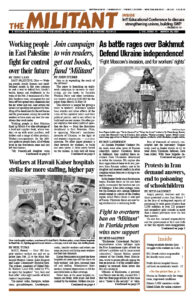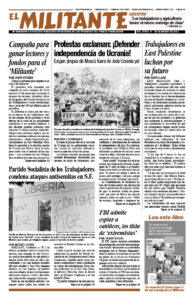“Taking care for the imagination and fast-developing minds of young children,” the editors at Puffin, a division of Penguin Random House, pontificated Feb. 24, “is a responsibility.” This was why they had to bowdlerize 17 titles by children’s author Roald Dahl. The books include The Fantastic Mr. Fox, Charlie and the Chocolate Factory and James and the Giant Peach.
What bosses at the world’s biggest publisher of children’s books meant by “taking care” involved purging Dahl’s characters of descriptions he gave them as being “fat,” “ugly” or “crazy.” Their cleansing also included excising all mention of “whiteness,” including in a description of bed sheets.
Alongside this they scrubbed out references to “mothers and fathers” and “brothers and sisters.” The new sanitized editions replace those terms with “parents” and “siblings.” But wiping out references to biological differences in the name of “inclusivity” in fact reinforces anti-scientific notions. It turns “men” and “women” into subjective categories that can simply be changed at will, part of denying the reality of women’s oppression under class society and diminishing the necessity of struggling to end it.
Puffin bosses’ eradication of “offensive” terms was recommended to the publisher by consultants from an outfit called Inclusive Minds. They claim to speak for those with “lived experience,” by which they mean people the company says are oppressed. They say their self-righteous mission is to rampage through literature “reviewing language that can be damaging and perpetuate harmful stereotypes.”
The woke censorship of Dahl’s works was blessed by the Roald Dahl Story Company, which now manages the late author’s copyright and is owned by entertainment giant Netflix.
The class bias of the meritocratic-minded censors was not far below the surface. For example, in Dahl’s The Witches the phrase “even if she is working as a cashier in a supermarket or typing letters for a businessman” is wholly rewritten. It’s replaced with the phrase “even if she is working as a top scientist or running a business.” As if transforming cashiers into capitalists in a classic work of literature does anything to advance the status of women!
Elsewhere the censors impose their own predilections — for “good” writing and subject matter — for ones they deem unacceptable.
In Matilda, the girl at the center of the story describes the impact of her early reading experiences: “She went on olden-day sailing ships with Joseph Conrad. She went to Africa with Ernest Hemingway and to India with Rudyard Kipling.” But the authors that Dahl describes are on the politically correct “cancelled” list. Dahl’s book now contains authors favored by the more right-thinking editors. It says “she went to nineteenth century estates with Jane Austen,” and “she went to California with John Steinbeck.”
The censors act on a class outlook based on their deeply held belief they must administer and regulate the lives of working people on behalf of the capitalist ruling families, including what we and our children read. Underneath their feigned empathy for the oppressed is a view that the working class is backward and reactionary. They think we can’t be trusted to learn from past classics and must be prevented from forming our own opinions.
Following an outcry over their censorship, bosses at Puffin announced they would keep the old unexpurgated versions in print as well as print and promote their new woke versions. Perhaps they think that this way they can both push their woke line and maximize their profits.
Next in line for a rewrite, the New York Post reports, are Ian Fleming’s James Bond novels. Depending on the censors’ zeal, there may not be a lot left of the philandering British spy in the new versions.

